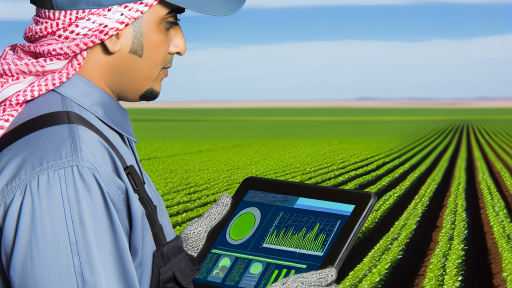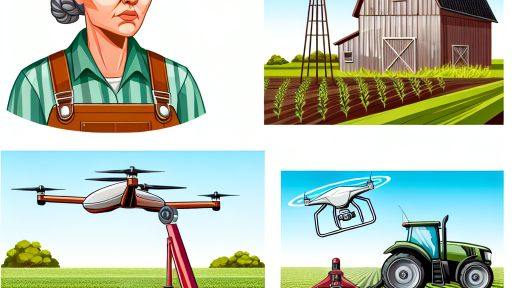Introduction to Agri-Fintech and Its Relevance to Small-Scale Farmers
Agri-fintech merges agriculture and financial technology effectively.
This approach provides small-scale farmers with innovative solutions.
Such solutions address specific financial challenges they face.
Access to funding remains a significant hurdle for many farmers.
Agri-fintech platforms offer tailored financial products and services.
For instance, farmers can gain easy access to microloans.
These financial aids support purchasing seeds and equipment.
Moreover, agri-fintech enhances financial literacy among farmers.
Farmers learn how to manage finances and investments effectively.
This education empowers them to make informed decisions.
Furthermore, agri-fintech solutions utilize data analytics.
They provide insights to improve farming yields and efficiency.
For example, farmers can track crop performance over time.
As a result, they can adjust practices to maximize output.
Additionally, many platforms focus on sustainable practices.
Transform Your Agribusiness
Unlock your farm's potential with expert advice tailored to your needs. Get actionable steps that drive real results.
Get StartedThese practices align with growing consumer interest in sustainability.
Agri-fintech thus supports eco-friendly farming initiatives.
In summary, agri-fintech is crucial for modern small-scale farming.
It enhances financial access, education, and operational efficiency.
Consequently, farmers can thrive in a competitive market.
Improved Access to Finance Through Peer-to-Peer Lending Platforms
Understanding Peer-to-Peer Lending
Peer-to-peer lending connects farmers directly with individuals willing to invest.
This model eliminates traditional financial intermediaries.
As a result, farmers can secure loans faster and with fewer requirements.
Benefits for Small Scale Farmers
Small scale farmers experience enhanced access to financial resources.
These platforms provide competitive interest rates compared to banks.
Additionally, farmers can tailor loan amounts to their specific needs.
Streamlined Application Processes
Peer-to-peer lending platforms often feature simplified application procedures.
Farmers can complete applications online at their convenience.
Moreover, decisions are typically made quickly, enabling timely funding.
Building Community Connections
Peer-to-peer lending fosters a communal approach to financing agriculture.
Farmers can gain support from local investors who understand their needs.
This connection can lead to more targeted investments that benefit the community.
Increased Financial Literacy
Using these platforms often encourages farmers to improve their financial knowledge.
Many lending platforms offer resources to aid understanding of financial management.
This knowledge empowers farmers to make informed financial decisions.
Access to Alternative Funding Sources
Peer-to-peer lending introduces farmers to alternative financing options.
This diversifies their sources of capital beyond traditional banks.
Consequently, farmers can pursue new opportunities for growth and expansion.
Enhanced Financial Literacy and Management via Mobile Apps and Online Resources
Accessing Knowledge and Tools
Mobile apps provide easy access to financial information.
Showcase Your Farming Business
Publish your professional farming services profile on our blog for a one-time fee of $200 and reach a dedicated audience of farmers and agribusiness owners.
Publish Your ProfileFarmers can learn essential skills through interactive resources.
Online platforms offer tutorials on budgeting and financial planning.
This knowledge empowers small-scale farmers to make informed decisions.
Streamlined Record-Keeping
Modern agri-fintech solutions simplify record-keeping.
Farmers can track income and expenses effortlessly through mobile apps.
These tools ensure accurate financial tracking and reporting.
As a result, farmers can pinpoint areas for cost reduction.
Improved Access to Financial Products
Agri-fintech solutions bridge the gap between farmers and financial institutions.
Mobile apps help users connect with local banks and credit providers.
This access can lead to more favorable loan options.
Farmers can explore tailored financial products for their unique needs.
Promoting Savings and Investment
Financial literacy tools encourage farmers to save and invest wisely.
Mobile apps offer insights into setting savings goals.
Farmers learn the importance of emergency funds for unexpected situations.
Investment strategies become more accessible through user-friendly platforms.
Building Community and Support Networks
Agri-fintech platforms often foster community among users.
Farmers can share experiences and tips with peers through forums.
These interactions enhance collective financial literacy.
Support networks help farmers navigate challenges together.
Uncover the Details: Enhancing Farm Productivity Through Agri-Fintech Innovations
Streamlined Supply Chain Management Through Digital Platforms
Improved Inventory Management
Digital platforms enhance inventory management for small-scale farmers.
They offer real-time tracking of stock levels.
This ensures that farmers know when to reorder supplies.
Consequently, they can avoid overstocking and wastage.
Additionally, these platforms help farmers predict future inventory needs.
Efficient Procurement Processes
Digital solutions simplify the procurement process for farmers.
Farmers can access multiple suppliers at once.
This increases competition and often results in better prices.
Moreover, farmers can order resources directly through apps.
Streamlined procurement enhances overall efficiency.
Enhanced Communication with Buyers
Agri-fintech tools improve communication between farmers and buyers.
Farmers can share crop availability and prices instantly.
This results in more accurate and timely transactions.
Effective communication ultimately boosts trust between parties.
It also allows farmers to respond quickly to market demands.
Data-Driven Decision Making
Digital platforms provide valuable data insights for farmers.
They can analyze historical sales trends and customer preferences.
Using this data, farmers make informed decisions about production.
Data analytics can lead to optimizing crop choices.
Consequently, this drives better profitability for farmers.
Showcase Your Farming Business
Publish your professional farming services profile on our blog for a one-time fee of $200 and reach a dedicated audience of farmers and agribusiness owners.
Publish Your ProfileYou Might Also Like: How Sensor Technology Enhances Crop Disease Monitoring On Farms
Data-Driven Decision Making Using Analytics for Resource Allocation
The Importance of Data in Agriculture
Data plays a crucial role in modern agriculture.
It empowers small-scale farmers to make informed decisions.
With access to accurate information, farmers can optimize their operations.
This leads to better outcomes and increased productivity.
Enhancing Resource Allocation
Analytics helps farmers understand their resource needs.
It provides insights into soil health, water usage, and crop patterns.
By analyzing this data, farmers can allocate resources more efficiently.
This not only reduces waste but also lowers production costs.
Improved Crop Management
Data-driven analytics aids in effective crop management strategies.
Farmers can track crop performance throughout the growing season.
They can adjust planting schedules and irrigation based on real-time data.
This flexibility enhances yields and lowers risks of crop failure.
Predictive Analysis for Future Planning
Predictive analytics allows farmers to anticipate future challenges.
It uses historical data to forecast weather patterns and market trends.
This foresight helps farmers plan their activities accordingly.
As a result, they can take proactive measures to mitigate risks.
Access to Financial Support
Agri-fintech solutions often provide access to financing options.
Farmers can use data analytics to demonstrate creditworthiness.
This opens doors to loans and grants that were previously inaccessible.
Financial support ultimately fuels growth and sustainability.
Uncover the Details: Integrating Renewable Energy into Large-Scale Farms

Facilitation of Crop Insurance Through Innovative Tech Solutions
Introduction to Crop Insurance
Crop insurance protects farmers against financial losses.
Given unpredictable weather, it serves as a safety net.
Small scale farmers particularly benefit from this support.
The Role of Agri-Fintech
Agri-fintech solutions revolutionize how farmers manage risks.
These platforms simplify access to crop insurance products.
Farmers can quickly compare and select the best options.
Instant Coverage Assessments
New technologies enable instant assessments for coverage.
Farmers can receive real-time insights into their insurance needs.
This immediate feedback helps them make informed decisions.
Streamlined Claim Processes
Technology streamlines the insurance claim process significantly.
Farmers can report losses through user-friendly applications.
Quick processing enables timely compensation, aiding recovery.
Educational Resources and Support
Agri-fintech platforms often provide educational resources.
Farmers receive guidance on best practices for insurance use.
This knowledge empowers them to maximize their policy benefits.
Networking Opportunities
These solutions often create networking opportunities for farmers.
Farmers can connect with insurance experts for personalized advice.
Building relationships with insurers enhances trust and support.
Showcase Your Farming Business
Publish your professional farming services profile on our blog for a one-time fee of $200 and reach a dedicated audience of farmers and agribusiness owners.
Publish Your ProfileImplications for Crop Insurance Accessibility
Agri-fintech solutions significantly enhance crop insurance access.
They empower small scale farmers to protect their livelihoods.
This innovative approach enables resilience and sustainability in agriculture.
You Might Also Like: Understanding CRISPR Technology In Agriculture
Opportunities for Market Access and Better Pricing via E-commerce Platforms
Increased Market Access
E-commerce platforms allow small scale farmers to reach larger markets.
This expanded reach helps farmers to find new customers.
Additionally, farmers can access buyers beyond their local areas.
Consequently, they can increase their sales volumes significantly.
Moreover, online marketplaces provide a level playing field.
They empower farmers to compete with larger agricultural businesses.
Better Pricing for Products
Using e-commerce can lead to improved pricing structures for farmers.
Farmers often gain higher prices by selling directly to consumers.
This eliminates intermediaries who typically take a cut of the profit.
Moreover, farmers can set their prices based on market conditions.
They can adapt quickly to fluctuations in supply and demand.
Consequently, better pricing can improve their profit margins.
Streamlined Sales Process
E-commerce simplifies the sales process for farmers.
They can manage orders and inventory online with ease.
This eliminates the need for extensive paperwork and logistics.
Additionally, payment gateways offer secure transactions.
Farmers receive payments quickly, which improves cash flow.
In summary, e-commerce platforms enhance operational efficiency.
Building Direct Relationships with Consumers
Online platforms facilitate direct communication between farmers and consumers.
Farmers can learn about customer preferences and feedback in real-time.
This engagement helps farmers tailor their offerings to meet demand.
Furthermore, it fosters loyalty and trust among consumers.
As a result, farmers establish a loyal customer base.
This direct connection also opens opportunities for value-added products.
Promotion of Sustainable Farming Practices Through Financial Incentives and Credits
Encouraging Eco-Friendly Methods
Agri-fintech solutions play a vital role in promoting eco-friendly farming methods.
These solutions provide financial support for farmers adopting sustainable practices.
Farmers can access credits that encourage environmentally responsible techniques.
Such practices include crop rotation, organic farming, and reduced chemical use.
Access to Financial Resources
Small scale farmers often struggle to secure necessary funding.
Agri-fintech platforms bridge this funding gap with tailored financial products.
Farmers can apply for loans directly through these platforms.
The application process is often straightforward and quick.
As a result, farmers can obtain essential resources swiftly.
Incentives for Sustainable Innovations
Various agri-fintech solutions offer incentives for innovation in farming.
These incentives motivate farmers to invest in new technologies.
For example, precision farming tools help optimize resource use.
Showcase Your Farming Business
Publish your professional farming services profile on our blog for a one-time fee of $200 and reach a dedicated audience of farmers and agribusiness owners.
Publish Your ProfileFarmers often receive discounts or credits for adopting these technologies.
Building Stronger Farmer Communities
Agri-fintech platforms foster connections among farmers.
These connections create opportunities for knowledge sharing.
Farmers can learn from each other’s experiences with sustainable practices.
Collaboration leads to collective success in minimizing environmental impacts.
Tracking and Reporting Sustainability Efforts
Financial incentives often require tracking sustainability efforts.
Agri-fintech solutions provide tools to help farmers monitor their progress.
These tools offer insights into resource usage and waste reduction.
As a result, farmers can report their achievements accurately.
Advancing Policy Support for Sustainability
Data collected through agri-fintech platforms can inform policy makers.
This data helps advocate for more supportive policies for sustainable agriculture.
Stronger policies can lead to more significant financial incentives in the future.
As a result, the entire agricultural sector can benefit from sustainable practices.
Additional Resources
Agtech: Breaking down the farmer adoption dilemma | McKinsey
DIGITAL FARMER PROFILES: – Reimagining Smallholder Agriculture




